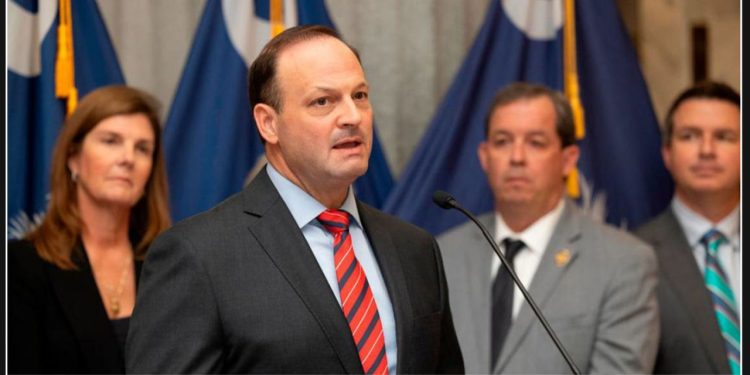Attorneys general from 24 states are urging the U.S. Supreme Court to uphold an Arizona law that prohibits biological boys from participating in girls’ sports teams.
A federal appeals court recently ruled that the law is likely in violation of the Equal Protection Clause of the Constitution. As a result, a petition has been initiated to address this issue.
“Girls’ sports teams are initially divided by sex in order to ensure fair competition, preventing girls from having to compete against boys,” emphasized South Carolina Attorney General Alan Wilson in a news release. Wilson further added that Arizona’s law, which restricts girls’ sports teams to biological females, is a practical measure that safeguards girls from having to compete against biologically male individuals who identify as females.
Federal Judge Challenges Parents Referring to Trans Athlete as ‘a Boy’ in Legal Fight over Pro-Girls Protests
A federal judge has raised concerns over parents referring to a transgender athlete as ‘a boy’ during a legal battle surrounding protests supporting girls in sports. The judge’s remarks highlight the ongoing debate regarding transgender rights and the inclusion of transgender individuals in sports.
The judge’s objection came during a court hearing where several parents were arguing against a Connecticut policy that allows transgender girls to compete in girls’ sports. The parents, who believe the policy unfairly disadvantages cisgender female athletes, referred to the transgender athlete as ‘a boy’ throughout the proceedings.
While the judge did not explicitly comment on the policy itself, they expressed concern over the parents’ language, stating that it appeared to be disrespectful and potentially harmful towards the transgender athlete. The judge emphasized the importance of using appropriate and respectful language when discussing transgender individuals, particularly in a legal setting.
This incident highlights the broader issue of how transgender athletes are treated and referred to in the context of sports. It also underscores the ongoing struggle between those advocating for transgender rights and those concerned about the potential impact on cisgender female athletes.
Proponents of transgender inclusion argue that transgender girls should be allowed to compete in girls’ sports in order to ensure fairness and equal opportunities. They argue that excluding transgender girls would perpetuate discrimination and deny them the right to participate in activities that align with their gender identity.
On the other hand, opponents of transgender inclusion raise concerns about the potential advantages that transgender girls may have due to physiological differences resulting from their assigned sex at birth. They argue that allowing transgender girls to compete in girls’ sports could put cisgender female athletes at a disadvantage and compromise the integrity of women’s sports.
This case is just one example of the legal battles and controversies surrounding transgender inclusion in sports. As the debate continues, it is crucial to engage in respectful and inclusive discussions that consider the rights and experiences of all individuals involved.
The petition is supported by attorneys general from a total of 24 states, including Alabama, Alaska, Arkansas, Florida, Georgia, Indiana, Iowa, Kansas, Kentucky, Louisiana, Mississippi, Missouri, Montana, Nebraska, New Hampshire, North Dakota, Oklahoma, South Dakota, Tennessee, Texas, Utah, Virginia, and Wyoming.
According to the petition, these states have laws resembling Arizona’s, which limit girls’ sports to biological females.
The argument is made that the Equal Protection Clause does not forbid states from providing distinct sports teams for males, females, boys, and girls.
The Girls Catholic School Volleyball team may face penalties following an incident where their fans booed a transgender athlete on a public school team.
The U.S. Supreme Court in Washington, D.C., was captured in a photograph on Tuesday, February 28, 2023. The image, taken by Valerie Plesch for Bloomberg, highlights the grandeur and importance of this iconic institution.
“In sports, ensuring equal access is crucial for maintaining a fair and competitive environment,” state the attorneys general in their brief. “A fair playing field often necessitates the division of sports teams based on sex, allowing girls to compete against other girls.”
The distinction between sports teams based on biology instead of gender identity is logical because it is the biological differences, not gender identity, that necessitate separate teams. Regardless of gender identity, biological males tend to be stronger and faster than biological females on average. If these average physical differences were not significant, there would be no need for segregating sports teams at all.
The petition contends that states are not prohibited by the Equal Protection Clause from providing separate sports teams for men, women, boys, and girls. (ALLISON DINNER/AFP via Getty Images)
Get the Fox News App by clicking here.
According to a news release from Wilson, the attorneys general are urging the high court to clarify that the Constitution does not prevent states from safeguarding women’s sports against unfair competition and ensuring equal athletic opportunities for girls and women.
